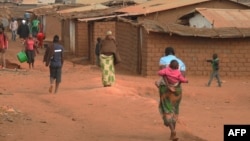“The camp itself is extremely overcrowded," UNHCR Malawi reporting officer Kenyi Emanuel said.
“The camp was only meant to host between 10,000 and 12,000 people but now, it is hosting 56,000 refugees and asylum seekers. It is a five-fold increase,” Emanuel said adding the estimated 8,000 refugees living outside the camp would bring more misery.
The refugee agency is asking the Malawi government to reconsider its decision to force refugees and asylum-seekers living in villages, towns, and cities back into the overcrowded Dzaleka camp.
In a statement released Saturday, UNHCR says relocating self-sufficient and productive people into the camp would not only lead to loss of livelihoods but also compel them to rely on dwindling humanitarian aid.
UNHCR says as of October 31 it had received less than a fourth of funds needed this year in Malawi to support the camp’s refugees and asylum-seekers.
Dzaleka is home to refugees and asylum-seekers from Burundi, the Democratic Republic of Congo, Ethiopia, Rwanda, and Somalia.
In August, Malawi’s government set November 30 as a deadline for those living in rural areas outside the camp to return and February 1 for those living in cities.
The decision came after a high court in Blantyre dismissed the refugees’ appeal against the government’s decision last year to return them to the camp.
Malawi’s Minister of Homeland Security Jean Sendeza at a televised press conference Thursday said the returns were in line with rules against refugees working or living outside the camp.
“As we continue with the relocation exercise, I request patience for all the stakeholders as this is an ongoing process,” he said.
Malawi’s government says it has budgeted $300,000 for tents for the returned refugees and their transport to the camp, which is expected to start this week.
Sendeza said UNHCR also pledged $58 million to reconstruct the abandoned Luwani refugee camp to help decongest Dzaleka.
UNHCR confirmed plans to restore the camp but say they’re facing challenges sourcing the needed funding.






